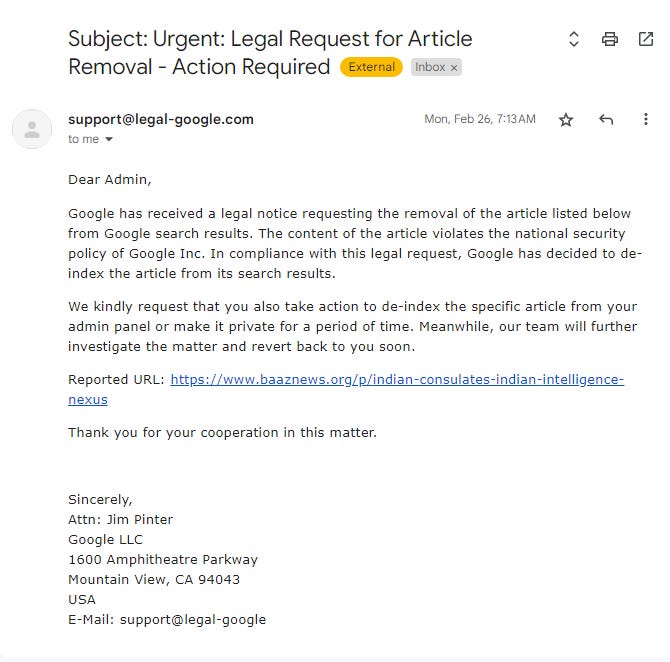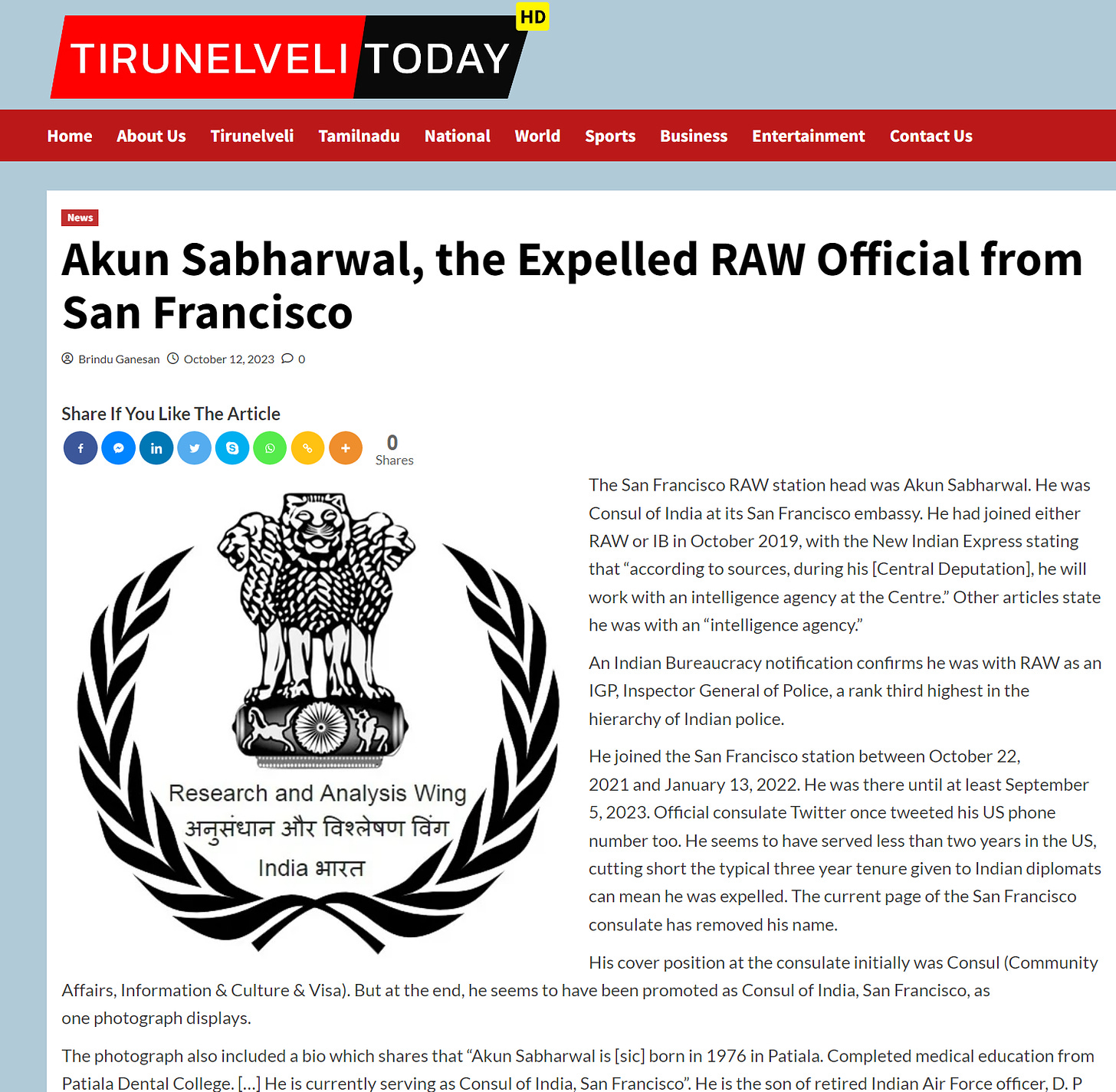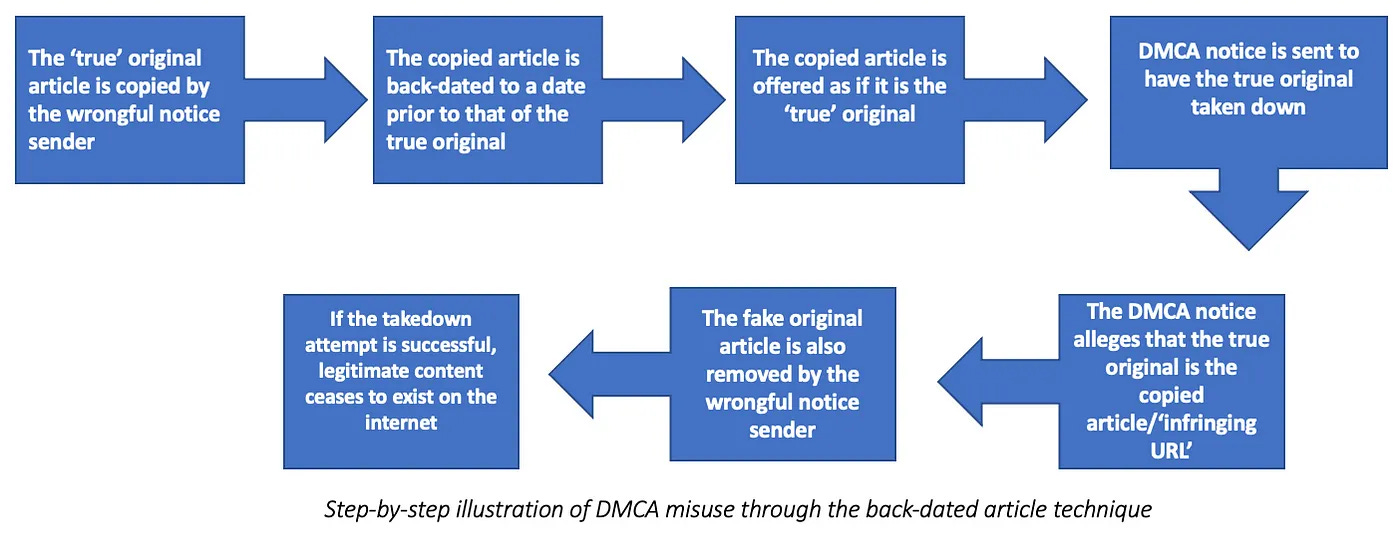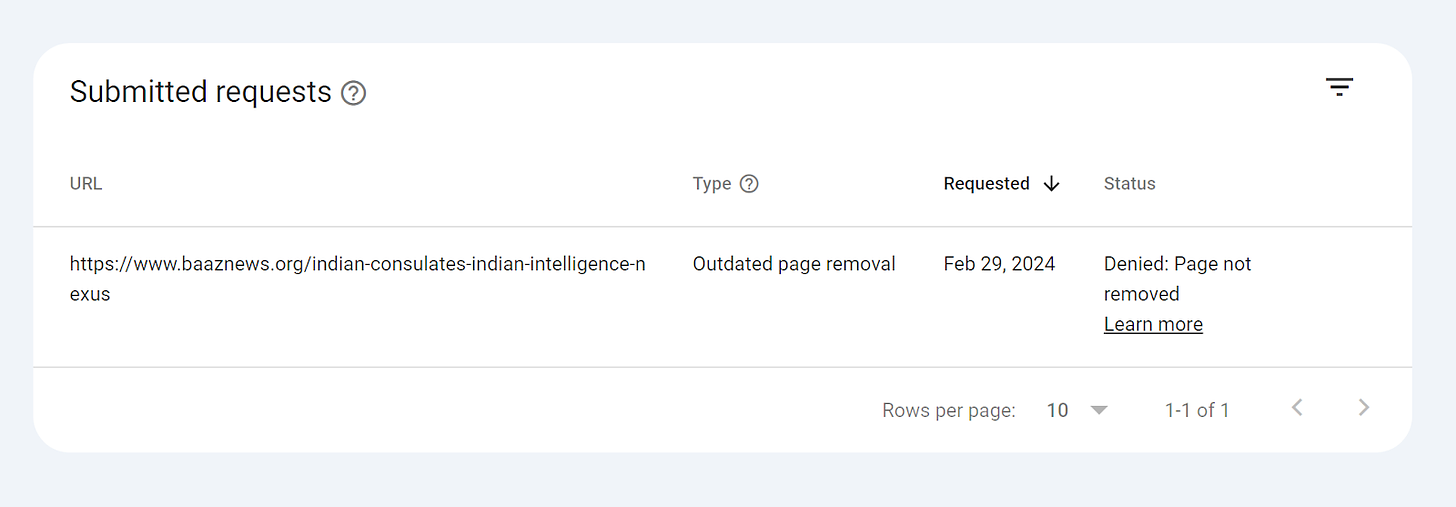
From The Editors
On December 11, 2023, Baaz published an in-depth investigation revealing RAW and IB agents operating out of Indian Consulates in the West.
The piece immediately became a go-to reference on how Indian Consulates and High Commissions are being utilized to engage in espionage and transnational repression against the Sikh community. From local police forces and security experts to mainstream journalists and Sikh organizations, the article has been read as an exposé on India’s use of diplomatic cover to engage in foreign interference in countries like Canada, America, and the UK.
The piece also became a target of Indian operatives, with multiple nefarious and failed attempts to de-index, unpublish, or delete the article over the span of two months.
The Fake Email
Suspicious activities targeting the article began on February 26, 2024, when an email spoofing an official Google correspondence was received in our general inbox.
“Urgent: Legal Request for Article Removal,” the subject line read in part.
“The content of the article violates the national security policy of Google Inc. In compliance with this legal request, Google has decided to de-index the article from its search results,” the email stated.
However, there is no “national security policy” of Google, and nor was the article de-indexed at the time, continuing to appear in search results.
We also found the last paragraph of the email peculiar.
“We kindly request that you also take action to de-index the specific article from your admin panel or make it private for a period of time.”

Under no circumstances would we voluntarily de-index our own article. That is beside the point, however. Why would Google ask us to de-index the piece when they could do that themselves with a single click?
The final flag was the email address “support@legal-google.com,” which does not follow the Google email suffix.
We ignored the spoof’s demands and forwarded it instead to the appropriate Google support address so they could flag it and provide any clarity.
Emails to Google requesting comments have gone unanswered.
This would only be the beginning of increasingly sophisticated attempts to remove the article from the internet.
Substack Temporarily Unpublished Article
It was during a conversation with a journalist from a major mainstream news outlet who referenced the article that we realized it had disappeared from our website on February 27, 2024.
Baaz currently operates on Substack, an online platform well-known for hosting independent reporting and media.
At first, we believed that someone on our team may have accidentally removed it. After we crossed that likelihood out, we suspected that our news site may have been hacked and the article deleted. However, shortly thereafter, we found it in a “drafts” folder in our Substack dashboard marked [UNPUBLISHED].
If we had been hacked, then why wouldn’t the hackers just outright delete the article? We would eventually learn that what actually happened was far more interesting.
Up to this point we had not received any correspondence from Substack warning us of the unpublishing or flagging any concerns or legal notices about our article. We promptly republished it, assuming there may have been a glitch or error, and then emailed Substack on February 28, 2024, asking for clarity on what exactly was going on.
We never received a response from Substack until they emailed us a survey shortly afterwards to ask how satisfied we were with the way they handled unpublishing our article “pending the resolution of an allegation of copyright infringement” complaint made by a “Brindu Ganesan” on February 26, 2024, as per the Digital Millennium Copyright Act (DMCA) and Substack’s policy.
This came as a surprise to our team, and we emailed Substack again, this time asking to be provided with the complaint itself and any particulars, as this was the first we were hearing of it.
In the meantime, the article remained up on the Baaz website, a move which Substack would penalize us for by temporarily blocking our ability to publish new content. A constraint that would be lifted in a matter of hours after they realized they had never sent us a formal email informing us why the article was unpublished to begin with.
The ability to continue to publish new content did come with a cost – our article exposing the Indian Consulates-Intelligence nexus would have to remain unpublished on our Substack website pending an investigation into the complainant’s allegations.
The Dubious Indian Copyright Complaint
On February 28, 2024, Substack finally sent us the DMCA complaint, including the content the complainant was alleging Baaz plagiarized. This was important because it was only after seeing the nature of the complaint that we could put in what is known as a “counter-notification” to challenge the claims being made against our article and have it republished if successful.
“Under the DMCA, you have the right to respond to this allegation of infringement by sending us a counter notification detailing why you believe your use of this content is not infringing,” Substack instructed Baaz, “Upon receipt of a counterclaim, Substack must notify the complaining party and send them a copy of your counterclaim. The complaining party then has 10 days to file a legal action in court and send Substack evidence that it has done so.”
The complainant’s submission against Baaz read as follows:
“I have written an exclusive article about Akun Sabharwal, detailing his work and association with Indian intelligence. This article was published on tirunelvelitoday.in on October 12, 2023, under the title ‘Akun Sabharwal, the Expelled RAW Official from San Francisco.’ Here is the URL: https://tirunelvelitoday.in/2023/10/akun-sabharwal-the-expelled-raw-official-from-san-francisco/ Unfortunately, the same article has been copied and posted on another website without my permission. This article was the result of our investigation and hard work, and we did not authorize anyone to publish it on their website. The copied content is being presented as part of the article under the subtitle ‘Akun Sabharwal, the Expelled RAW Official from San Francisco.’ I request that you review the reported article and take the necessary action immediately.”
The Tirunelveli Today article linked to in the complaint is a verbatim copy of the section specifically looking at Akun Sabharwal from our true original article published in December 2023.

Who is Behind Tirunelveli Today?
Tirunelveli is a city in Tamil Nadu, India. However, on Tirunelveli Today’s About page, they describe themselves as “Singapore’s leading media company with the most complete range of platforms, spanning television, radio, newspapers, magazines, movies, digital and out-of-home media.”
In reality, not only is that a patent lie, but their About page is almost an entirely plagiarized copy of an About page from a real Singaporean media company, Channel NewsAsia (CNA).
When investigating the website’s Relationships/IP Addresses to find other potential sites being hosted on the same server and ownership, we discovered that there are many variations of the fake news site, with the same plagiarized About page and style of content being run under other mostly South Indian city names, including Tiruchi Today, Madurai Today, Chennai Today, Coimbatore Today, Nagercoil Today, Cochin and even one in Hindi from Bihar. The sites are all hosted on a single server by Hostinger. An organization running multiple low-level operations can share hosting between websites to save money.
However, one relationship under the same IP address and hosting server as Tirunelveli Today particularly stood out – legal-google.com. The domain, which was used to send the spoof Google email requesting we deindex the article, was registered in April 2022 under the same ownership as Tirunelveli Today. A direct link between the various attempts to remove our piece.
Searching for Tiruneveli Today and their sister websites on Twitter also led us to an ecosystem of bot accounts sharing their articles. This brought us to Sky Valley Solutions, a Tamil Nadu based company that, among other things, offers reputation management services. In fact, it even offers the ability to get articles removed from Google searches. Unsurprisingly, the company also shares the same IP address and hosting server as Tirunelveli Today.
We found a Twitter profile purporting to belong to Annamalai Arunachalam, the CEO of Sky Valley Solutions. His name appears in the company’s trademark registration. He also runs Chasseur Cyber Solutions Limited, whose website runs on the same IP address as Tirunelveli Today.
As reported in our targeted article, Sarvesh Raj and his wife, Amanat Mann, both have a Tamil Nadu connection.
The Abuse of the DMCA Notice-and-Takedown Process
What Substack shared with us was a dubious and false complaint utilizing a backdated plagiarized copy of our true original work. It abused and weaponized the DMCA notice-and-takedown process to silence investigative journalism scrutinizing the Indian government.
This is, in fact, one of the most common general critiques of the DMCA procedure followed by portals and platforms, like Substack, which is used in this nefarious way by bad faith actors, including autocratic countries and despotic governments, to get articles and pieces critical of them unpublished, even on a temporary basis.

Responding to Substack Regarding the DMCA Notice
“The complainant has actually copied a section of our article,” we explained in our February 28, 2024, counter-notification to Substack, “The only difference between the two is our article contains many hyperlinks to our source materials and citations. Their plagiarized copy of our article includes none of the hyperlinks to source materials. We imagine it is partly because we link to a lot of archived materials, which we had uploaded ourselves. Linking to those sources would expose their lie.”
“What has occurred here is quite simple,” our submission further illustrated for Substack:
- The complainant copied a section of our article verbatim.
- They then published it on a dubious website with no pedigree, which is typical of Indian disinfo networks, as reported on by the likes of the EU Disinfo Lab and others, including the BBC and CBC.
- The author, Brindu Ganesan, has never published anything before this or after. There is also no trace of them on any website or other platforms.
- After publishing the plagiarized article, they backdated it so that it would appear as if it was published before ours for the purpose of a copyright infringement complaint. Their publish date was October 12, 2023, while ours was December 11, 2023.
“Our well-researched article, which had gone through multiple drafts and edits, has been a source of critical information for other journalists, NGOs, and government officials,” we shared, “It has now been removed at a critical time, when Indian foreign interference and transnational repression are making global headlines.”
A scan of the complainant’s page’s creation date also seemed to indicate it was published in February 2024, not October 2023, a matter that was also flagged with Substack for further investigation.
Within 24 hours, on February 29, 2024, Substack responded to our submission.
“After reviewing the circumstances, we have determined that the content can be republished immediately, in exception to our standard policy,” they shared. “The counter notice you submitted has still been passed along to the complainant, and we may remove content further should we receive evidence of legal action.”
Substack would never unpublish our article again and would inform us after the 10-day period that the complainant never sent further proof or initiated legal proceedings to contradict our counter-notification.
First Attempt to De-index the Article on Google
On February 29, 2024, unbeknownst to us, amidst our dealings with Substack, Google received a request seeking to remove our article’s hyperlink from the search engine under an “Outdated page removal” submission. We are not sure who put the request in, but assume it was from the same Indian operatives that made the DMCA complaint.

The “Outdated page removal” request is typically complied with when the URL being submitted no longer exists because it has been deleted or unpublished, for example, and should therefore be wiped from the Google index and search results.
Google denied the request, however, because the page was still up as Substack republished it that same day under exceptional circumstances, luckily before Indian operatives made their submission to Google.
Second Dubious Indian Copyright Complaint & Attempt to De-index From Google
Five days later, on March 5, 2024, after the failed attempt to get the article unpublished on Substack or removed via an “Outdated page removal” request to Google, another DMCA complaint was sent directly to Google to have the article de-indexed on their search engine over a copyright infringement.
We did not learn about the complaint until March 12, 2024, when it was flagged to us that the article no longer appeared in Google searches. Up until that point, we had never received a notice or correspondence directly from Google about the allegations.
When searching for the article on Google, the following notice was published in the results.
“In response to a complaint we received under the US Digital Millennium Copyright Act, we have removed 1 result(s) from this page. If you wish, you may read the DMCA complaint that caused the removal(s) at LumenDatabase.org.”
It was by visiting the notice on the Lumen Database that we learned that the complaint against us was from the very same source as the failed Substack one.

The process that followed was similar to Substack.
We submitted our counter-notification to Google on March 13, 2024, and received a follow-up on March 18, 2024, seeking more information, which we complied with immediately.
On March 21, 2024, Google emailed Baaz to inform us that they had forwarded our counter-notification to the complainant and shared that “if we don’t receive proof that they have filed a legal action against you within 10 business days, we’ll reinstate the material in question.”
10 business days later, on April 4, 2024, the article was relisted on Google, where it still can be found.
What’s Next for Baaz
Our small team at Baaz does incredible work. We are proud of the impact our journalism has had within and outside of the Sikh diaspora.
Our article exposing RAW assets operating out of Indian consulates is critical reporting that builds upon four decades of Sikh community lived experience of Indian diplomats using their cover in the West to not only engage in spying but also foment discord. A topic which has been featured heavily in the recent Public Inquiry into Foreign Interference happening right now in Ottawa, Canada.
We have faced threats to our work. We have been censored in India across social media platforms. We have received caution from supporters to be careful in light of Indian transnational repression. However, facing this kind of shadowy attempt to remove a single article is not something we have experienced over our three years of existence.
We wear this type of attention with pride and honour.
It means our reporting matters, that independent Sikh media is incredibly important, and that we will continue unapologetically.
source : baaznews
